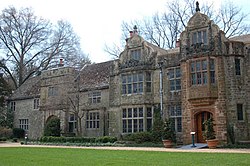Virginia House
|
Virginia House
|
|

Facade of Virginia House
|
|
| Location | 4301 Sulgrave Rd., Richmond, Virginia |
|---|---|
| Coordinates | 37°33′12″N 77°30′12″W / 37.55333°N 77.50333°WCoordinates: 37°33′12″N 77°30′12″W / 37.55333°N 77.50333°W |
| Area | 8.8 acres (3.6 ha) |
| Built | 1925 |
| Architect |
Henry G. Morse (re-creation) Charles Gillette (landscape) William Lawrence Bottomley (1946 addition) |
| Architectural style | Classical Revival, Tudor Revival, Flemish |
| NRHP Reference # | 89001933 |
| VLR # | 127-0255 |
| Significant dates | |
| Added to NRHP | June 13, 1990 |
| Designated VLR | June 20, 1989 |
Virginia House is a manor house on a hillside overlooking the James River in the Windsor Farms neighborhood of Richmond, Virginia, United States.
The house was constructed from the materials of the sixteenth-century Warwick Priory in Warwickshire, England, and shipped over and reassembled, completed several months before the . Virginia House is in the Tudor architectural style but incorporates a range of designs from other English houses and has modern facilities such as ten baths and central heating.
Virginia House was built by Alexander and Virginia Weddell, salvaging many materials from the Priory and other old English manor houses and adding further elegant English and Spanish antiques, oriental carpets, silks, and silver. Today Virginia House is operated by the Virginia Historical Society as a house museum, although it largely remains as it was in the 1940s during the Weddells’ tenancy. Immediately to the west of the property is Agecroft Hall.
The façade of Virginia House was originally located on the grounds of the former Augustinian Priory of the Holy Sepulcher of Jerusalem (Warwick Priory) in Warwick, England, founded in 1109. In 1536, at the Dissolution of the Monasteries, the priory was shut down and the land later bought by a politician named Thomas Hawkins alias Fisher, during the reign of Edward VI. Fisher demolished most of the monastic buildings and erected the house which he named "Hawk's Nest," set among gardens. He entertained Elizabeth I at the house. The property was bought in 1709 by Henry Wise, Royal Gardener to Queen Anne. In the mid-nineteenth century, it was purchased by the Lloyds Bank family who put the manor up for sale at auction in 1925.
...
Wikipedia


